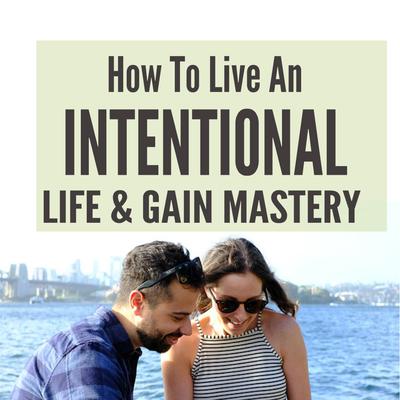How to Live an Intentional Life
There’s a lot of talk about intentional living. But what does it really mean? Intentional living is living with purpose and making decisions that support that purpose.
It’s the opposite of what most people do. Most people are satisfied with the status quo and only take action to deal with their disasters that happen along the way.
Intentional living is about choosing the type of person you want to be and the type of life you want to live, and then holding yourself to it.
Try these techniques to live an intentional life and stop relying on luck:
1. Understand that choices matter.
An intentional life is all about making choices that make sense for you and your beliefs.
Your choices determine the direction of your life and are the first step to creating the results you experience.
◦ Your greatest power is the power of decision.
◦ Your past doesn’t have to be an issue. You can change how you view the world and live in a new way.
2. Describe your dream life.
Have a target in mind. Think about how you’d like to live. Be bold and leave your limitations behind for a moment.
◦ Think about your ideal day. How would you spend your time? Who else would be there? Where would you live? What would your finances be like?
Give it some thought.
3. Know your values.
A big part of intentional living is living according to your values. It’s not about reacting to everything in the most expedient fashion.
It’s about living on your own terms. It’s necessary to be intimately familiar with your values to accomplish that.
4. Set goals for the major areas of your life.
These typically include your finances, career, relationships, and health. Of course, you can add as many categories as you need, depending on your aspirations and values.
5. Choose habits that support those goals.
Intentional living is much easier with supportive habits in place. You’ll run out of willpower otherwise.
Pick a couple of simple, but effective habits that will help you to attain each of your goals and begin implementing them.
6. Choose how you spend your time.
Most of us don’t give a lot of thought to what we do each day. Keeping your dreams and values in mind, what is the best thing for you to do at this moment?
What do you need to accomplish today? Make choices and avoid operating on autopilot.
7. Gain control over your impulses.
Most of our impulses lead us in the wrong direction. They’re often habitual and related to pleasure or avoiding discomfort.
Intentional living is about making rational decisions and following through regardless of comfort.
◦ Following your impulses is the opposite of intentional living.
8. Reject distractions.
This includes all distractions, including thoughts of the past or future. Intention require presence. Distractions are by definition things you shouldn’t be doing at that moment.
Even paying your bills can be a distraction if you should be doing something more important at that time.
9. Measure yourself.
How well did you do today at living intentionally? What challenges did you face? Where did you fall short? What can you do tomorrow even better than you did today?
◦ Learn something from each day that you can apply to the future.
Are you choosing and creating your life or just living by default? Having a life you love will never happen by accident.
Be bold enough to choose the life you want to lead. Decide the type of person you want to be. Make your decisions and choose your actions accordingly.
Live intentionally. It’s the best way to respect yourself and your life.

Deliberate Practice and How to Use It to Gain Mastery
There has been a lot of attention focused on the idea of deliberate practice over the last few years.
There are several books on the topic and a large body of associated research. There’s no doubt that deliberate practice is the best way to advance your expertise.
But what is deliberate practice?
Can anyone use this technique?
Follow this process to use deliberate practice to master what you want:
1. Identify your weaknesses.
Which skills would you like to strengthen? Ask yourself how you can best use the time you have available to you.
What specific skill can you practice that will bring you the greatest benefit?
2. Have a purpose for your practice session.
It’s not enough to just go to the driving range and hit golf balls mindlessly. Randomly pulling out sheet music and playing the piano won’t help much.
Before you begin practicing anything, it’s necessary to know exactly what you’re trying to accomplish.
◦ Think about your practice session and write down your objectives. “Learn the C Major scale.”
◦ Know your intention before getting to work.
3. Do it daily.
Regular practice is key. If you only practice once a week, your progress will be much slower. Your highest level of development will also be much lower. There’s no substitute for consistent practice.
◦ Practice more than once each day to maximize the effect.
4. Focus.
Deliberate practice requires your full attention. You know that your practice session will be less effective if you’re staring out the window or daydreaming.
◦ The quality of your practice is dependent on the amount of focus you can create and maintain.
5. Seek to improve.
It’s all about improvement, not just repetition. Try to make each attempt better than the last.
◦ Constant improvement is the goal of deliberate practice. Mastery requires a lot of incremental improvement. If your intention is to improve, your rate of improvement will be higher.
6. Have a mentor.
A mentor can make all the difference. A mentor can have a variety of titles: expert, teacher, or coach. Regardless of the title of your mentor, what’s important is their expertise.
◦ A great golf coach can immediately pinpoint the error in your swing. A piano teacher knows what’s wrong with your hand position.
◦ Find a subject expert to help you. Feedback is critical to deliberate practice. Without it, you might be practicing the wrong things over and over. Are you sure you’re doing it correctly?
7. Allow time to rest.
Physical and mental recovery are necessary. For example, focus can only be maintained for so long before you run out of gas.
Experiment and find the optimal length of practice sessions for you. How much of a break do you need? Only you can determine that.
8. Deliberate practice cannot overcome all.
If you’re short, slow, and middle-aged, you won’t play in the NBA, no matter how much you practice.
◦ Deliberate practice is the best way to come close to realizing your full potential at a particular task. It cannot give you potential.
Deliberate practice consists of using your time in a very intentional and focused way.
Identify your weaknesses and build your practice routine to address them. Consistent practice is the key.
With deliberate practice, you will discover what you’re really capable of.
Related Reading: https://www.discoveryhub.net/self-development-plan-sample.html
Did you find this post fun, informative and useful? If so, please share it with others!
If you have a comment, question or suggestion, please leave a comment below!
Cheers, Helene Malmsio
Related Reading: https://www.discoveryhub.net/self-development-plan-sample.html
Comments for How to Live an Intentional Life
|
|
Click here to add your own comments Join in and write your own page! It's easy to do. How? Simply click here to return to Self Help. |

"Power Tips" magazine is back!
You Get A Free Complete Self Help Report delivered to your email box every edition, plus you get a free PLR article and other great gifts!
SUBSCRIBE BELOW ... I promise you will want to USE what you learn!
I really want to know what you think of this site, this page, and to hear your tips or suggestions about it.
So please share your story or simply add a Comment in the comment box.
If you feel that the information on this page has been useful to you please give it a Like or share it with your friends - thanks!!
"You are a life Saver!!
I recently discovered this site and I can tell you that my life has not been the same. I now come here EVERYDAY and spend at least 1 hour.
I used to spend that time browsing online fashion and beauty
magazine which just means that I spend more. Now I have replaced that
habit with coming here.
In future I will think about contributing articles as well. Thank you! Thank you!! Thank you!!! and God bless"
Contact Us | About Us | Terms of Use | Privacy Policy | FAQ | Testimonials
Amazon and the Amazon logo are trademarks of Amazon.com, Inc. or its affiliates. As an Amazon Associate I earn from qualifying purchases. Product prices and availability are accurate as of the date/time
indicated and are subject to change. Any price and availability
information displayed on [relevant Amazon Site(s), as applicable] at the
time of purchase will apply to the purchase of this product.













